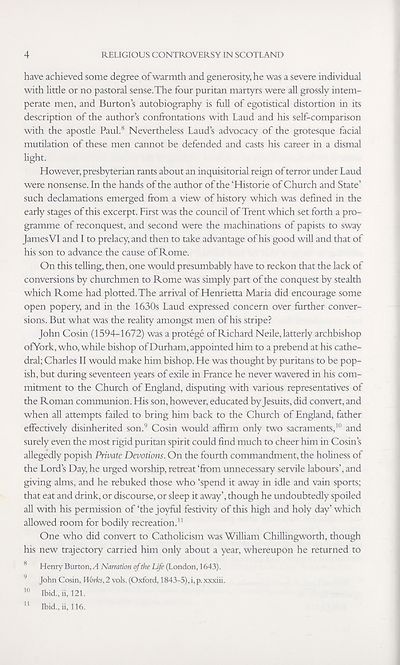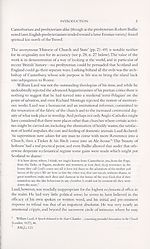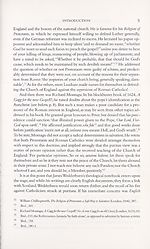Series 5 > Religious Controversy in Scotland 1625-1639
(19) Page 4
Download files
Complete book:
Individual page:
Thumbnail gallery: Grid view | List view

4
RELIGIOUS CONTROVERSY IN SCOTLAND
have achieved some degree of warmth and generosity, he was a severe individual
with little or no pastoral sense. The four puritan martyrs were all grossly intem¬
perate men, and Burton’s autobiography is full of egotistical distortion in its
description of the author’s confrontations with Laud and his self-comparison
with the apostle Paul.8 Nevertheless Laud’s advocacy of the grotesque facial
mutilation of these men cannot be defended and casts his career in a dismal
light.
However, presbyterian rants about an inquisitorial reign of terror under Laud
were nonsense. In the hands of the author of the ‘Historic of Church and State’
such declamations emerged from a view of history which was defined in the
early stages of this excerpt. First was the council of Trent which set forth a pro¬
gramme of reconquest, and second were the machinations of papists to sway
James VI and I to prelacy, and then to take advantage of his good will and that of
his son to advance the cause of Rome.
On this telling, then, one would presumbably have to reckon that the lack of
conversions by churchmen to Rome was simply part of the conquest by stealth
which Rome had plotted. The arrival of Henrietta Maria did encourage some
open popery, and in the 1630s Laud expressed concern over further conver¬
sions. But what was the reality amongst men of his stripe?
John Cosin (1594-1672) was a protege ofRichard Neile, latterly archbishop
ofYork, who, while bishop of Durham, appointed him to a prebend at his cathe¬
dral; Charles II would make him bishop. He was thought by puritans to be pop¬
ish, but during seventeen years of exile in France he never wavered in his com¬
mitment to the Church of England, disputing with various representatives of
the Roman communion. His son, however, educated by Jesuits, did convert, and
when all attempts failed to bring him back to the Church of England, father
effectively disinherited son.9 Cosin would affirm only two sacraments,10 and
surely even the most rigid puritan spirit could find much to cheer him in Cosin’s
allegedly popish Private Devotions. On the fourth commandment, the holiness of
the Lord’s Day, he urged worship, retreat ‘from unnecessary servile labours’, and
giving alms, and he rebuked those who ‘spend it away in idle and vain sports;
that eat and drink, or discourse, or sleep it away’, though he undoubtedly spoiled
all with his permission of ‘the joyful festivity of this high and holy day’ which
allowed room for bodily recreation.11
One who did convert to Catholicism was William ChiUingworth, though
his new trajectory carried him only about a year, whereupon he returned to
8 Henry Burton, A Narration of the Life (London, 1643).
9 John Cosin, Works, 2 vols. (Oxford, 1843-5), i, p. xxxiii.
10 Ibid., ii, 121.
11 Ibid., ii, 116.
RELIGIOUS CONTROVERSY IN SCOTLAND
have achieved some degree of warmth and generosity, he was a severe individual
with little or no pastoral sense. The four puritan martyrs were all grossly intem¬
perate men, and Burton’s autobiography is full of egotistical distortion in its
description of the author’s confrontations with Laud and his self-comparison
with the apostle Paul.8 Nevertheless Laud’s advocacy of the grotesque facial
mutilation of these men cannot be defended and casts his career in a dismal
light.
However, presbyterian rants about an inquisitorial reign of terror under Laud
were nonsense. In the hands of the author of the ‘Historic of Church and State’
such declamations emerged from a view of history which was defined in the
early stages of this excerpt. First was the council of Trent which set forth a pro¬
gramme of reconquest, and second were the machinations of papists to sway
James VI and I to prelacy, and then to take advantage of his good will and that of
his son to advance the cause of Rome.
On this telling, then, one would presumbably have to reckon that the lack of
conversions by churchmen to Rome was simply part of the conquest by stealth
which Rome had plotted. The arrival of Henrietta Maria did encourage some
open popery, and in the 1630s Laud expressed concern over further conver¬
sions. But what was the reality amongst men of his stripe?
John Cosin (1594-1672) was a protege ofRichard Neile, latterly archbishop
ofYork, who, while bishop of Durham, appointed him to a prebend at his cathe¬
dral; Charles II would make him bishop. He was thought by puritans to be pop¬
ish, but during seventeen years of exile in France he never wavered in his com¬
mitment to the Church of England, disputing with various representatives of
the Roman communion. His son, however, educated by Jesuits, did convert, and
when all attempts failed to bring him back to the Church of England, father
effectively disinherited son.9 Cosin would affirm only two sacraments,10 and
surely even the most rigid puritan spirit could find much to cheer him in Cosin’s
allegedly popish Private Devotions. On the fourth commandment, the holiness of
the Lord’s Day, he urged worship, retreat ‘from unnecessary servile labours’, and
giving alms, and he rebuked those who ‘spend it away in idle and vain sports;
that eat and drink, or discourse, or sleep it away’, though he undoubtedly spoiled
all with his permission of ‘the joyful festivity of this high and holy day’ which
allowed room for bodily recreation.11
One who did convert to Catholicism was William ChiUingworth, though
his new trajectory carried him only about a year, whereupon he returned to
8 Henry Burton, A Narration of the Life (London, 1643).
9 John Cosin, Works, 2 vols. (Oxford, 1843-5), i, p. xxxiii.
10 Ibid., ii, 121.
11 Ibid., ii, 116.
Set display mode to:
![]() Universal Viewer |
Universal Viewer | ![]() Mirador |
Large image | Transcription
Mirador |
Large image | Transcription
Images and transcriptions on this page, including medium image downloads, may be used under the Creative Commons Attribution 4.0 International Licence unless otherwise stated. ![]()
| Scottish History Society volumes > Series 5 > Religious Controversy in Scotland 1625-1639 > (19) Page 4 |
|---|
| Permanent URL | https://digital.nls.uk/127328193 |
|---|
| Description | Over 180 volumes, published by the Scottish History Society, containing original sources on Scotland's history and people. With a wide range of subjects, the books collectively cover all periods from the 12th to 20th centuries, and reflect changing trends in Scottish history. Sources are accompanied by scholarly interpretation, references and bibliographies. Volumes are usually published annually, and more digitised volumes will be added as they become available. |
|---|


